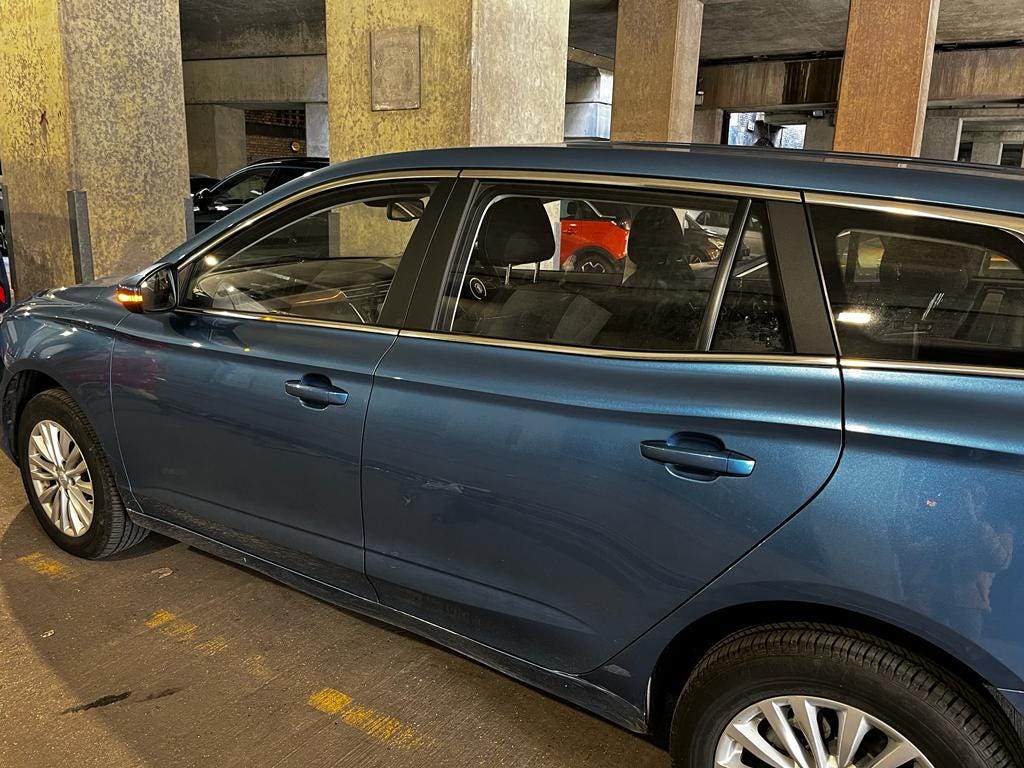We recently spent a week near Swansea visiting family and friends. We don’t own a car and we really wanted to take the train, but complexities with getting around meant that hiring a car for a week was the only workable option.
To mitigate our environmental impact we decided to hire an electric vehicle (EV). In the past we had really struggled to find one, but we found that Enterprise in Waterloo Station was renting cars for not much more than petrol cars, and so we decided we would give one a go.
So is it the answer?
Partly. Clearly there are no tail-pipe emissions from driving a fully electric vehicle. This means no NO2 pollution, and no direct impact on climate change. However, the electricity needs to come from somewhere so there are likely to be problematic emissions upstream. And these cars still have to be manufactured, involving all the raw materials and transportation impacts from the supply chain. Batteries in particular take a lot of resource and energy to manufacture. And it’s these batteries that have the biggest pollution impact while driving EVs: they make the cars heavier and so produce more tyre and road dust pollution (particulates, as we’ve discussed elsewhere). This could be offset by the benefits of regenerative braking, where some of the energy from the process of braking is used to recharge the car’s battery. This Birmingham University study tells you more.
There are also cultural and normative impacts (you could liken this to moving from smoking to vaping). For instance, promoting EV use does nothing to encourage more cycling, as road safety is the number one concern putting people off moving onto two wheels. Cycling has a much lower total environmental impact than car use, as well as having lots of other benefits.
The charge sheet
Some of our nervousness about hiring an EV came from concerns about charging, which have been well publicised (arguably, over-publicised). Our experience was decent overall: charging was simple in motorway services but patchy elsewhere. One factor we hadn’t anticipated was mobile connectivity: to start charging you enter your payment details via an app or web page on your phone and they were located where there was no data or WiFi! On the plus side, it was really cheap compared to petrol.
And finally
We are very happy that our blog is being publicised by Breathe London - thank you! We are a bit less happy that we’ve hit an issue with Brixton Rec being a listed building and so location of the monitoring node has got more complicated. We hope to bring good news… and our first data soon!







If you have friends and family living outside of a UK city you will likely require a car, even if you live in London, a point often overlooked by campaigners. We use our diesel car to leave London but still pay extraordinary prices to park it outside our home, yet it hardly moves between those out-of-London journeys. We are often told we should not have a car if we live in Lambeth, but your example proves this is simply not true. I have decided that it is not viable to sell our diesel car and purchase a new petrol hybrid to save the parking tax. Selling it would move the pollution it produces to another part of the UK, so out of sight out of mind, maybe. The investment in new public transportation links that are not just city-to-city requires investment the UK cannot afford. Maybe we should look to use what we already have, including our road network and find ways to gently (rather than the extreme Lambeth and TfL approach) nudge a change of culture. I don't like air or noise pollution but we have to accept that not every journey in London, which is about 25 miles north to south and 35 east to west, is not viable on a bicycle or using public transport alone. The UK is decades and trillions of pounds away from a car-free environment. European Cities are often referenced as a good example, but if you look more closely you will see they have a dual carriageway road network linking up neighbourhoods, as well as trams or local trains. You may also notice that they are not trying to design neighbourhoods around a Victorian infrastructure and often have a blank sheet allowing wide roads, wide cycle lanes and more public trams.
Slightly different note, but disappointing to see your estate hire car was made in China (MG 5). I own a little European-made EV, that is charged from a collection of PV panels on the roof of my home, which allows more local journeys where public transport is not viable. Two cars is an unintended consequence of the ULEZ being a blunt tool, unlike a similar model in France which has a graded system. Newer diesels pay a smaller ULEZ-style tax, older diesels pay a higher ULEZ-style tax. If one is paying the same for a 20-year-old diesel (a Euro 4), why bother changing it for a Euro 5, or 6. And if you live in Lambeth where you pay a diesel premium why bother changing it at all, when the diesel ICE is still one of the most efficient MPG offerings at this time? BMW 3 series can do 1000 miles on a single tank of diesel.
What your article suggests is that one size doesn't fit all and that we need a range of solutions to suit the needs of the public.
did you see this: https://community.breathelondon.org/c/brunswick-tenants-and-residents-association/taking-the-shine-off-the-ev-bubble
this is what i meant to respond to